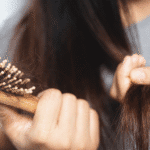Hair is more than just strands on our heads it’s tied to our confidence, identity, and how we feel about ourselves. But for many women, hair loss is a distressing reality. From stress to genetics, there are multiple causes behind hair thinning and excessive shedding. In this comprehensive guide, we’ll uncover the most common reasons for hair loss in women, the signs to look out for, and how to manage and prevent it.
Why Is Hair Loss in Women So Common?
Before we dive deep, let’s answer the big question: Why do women lose hair?
Unlike men, who mostly experience male pattern baldness, hair loss in women can be due to a variety of physical, hormonal, emotional, and genetic factors. According to dermatologists, nearly one-third of women experience noticeable hair thinning at some point in their lives.
Understanding the root cause is the first step towards effective treatment.
Genetics: Female Pattern Hair Loss
One of the most common causes is female pattern hair loss (FPHL), also known as androgenetic alopecia.
What is it?
- A hereditary condition where hair follicles shrink over time.
- Leads to gradual thinning, especially at the crown and along the hair part.
- Unlike men, women usually do not go completely bald but may have diffuse thinning.
When does it start?
Can begin as early as your 20s but is most common after menopause due to hormonal changes.
What can help?
- Early diagnosis.
- FDA-approved topical treatments like minoxidil.
- PRP (Platelet Rich Plasma) therapy.
- Lifestyle adjustments to support hair health.

Hormonal Imbalance and Hair Loss
Hormones play a massive role in hair health. Any imbalance can trigger hormonal hair loss in women.
Common hormonal triggers include:
Pregnancy & Postpartum: Many women notice luscious hair during pregnancy due to increased estrogen but experience significant shedding 2-4 months after delivery.
Menopause: Declining estrogen and progesterone levels can cause hair to thin.
Polycystic Ovary Syndrome (PCOS): High androgens can cause hair thinning on the scalp and unwanted hair growth elsewhere.
Thyroid Disorders: Both hyperthyroidism and hypothyroidism can lead to hair loss.
What can help?
- Consult an endocrinologist.
- Blood tests to check hormone levels.
- Medications or treatments to balance hormones.
- Gentle hair care routines to reduce breakage.
Stress and Hair Loss
In today’s fast-paced world, stress-related hair loss is becoming increasingly common.
How does stress cause hair loss?
Telogen Effluvium: Severe physical or emotional stress pushes large numbers of hair follicles into a resting phase. Hair falls out suddenly, often in handfuls.
Common triggers: major surgery, extreme weight loss, trauma, or emotional distress.
Signs to look for:
- Sudden shedding 2-3 months after a stressful event.
- Hair comes out easily when brushing or washing.
What can help?
- Stress management techniques like yoga, meditation, or exercise.
- Balanced diet rich in protein, iron, and vitamins.
- Patience — telogen effluvium often resolves within 6-9 months once the trigger is managed.

Nutritional Deficiencies
Your hair is the first to suffer when your body lacks key nutrients.
Common nutritional causes of hair loss include:
- Iron Deficiency: Especially common in women due to menstruation.
- Protein Deficiency: Crash diets or restrictive eating can starve hair follicles.
- Vitamin Deficiencies: Lack of B vitamins, vitamin D, and zinc can impact growth.
What can help?
- Include lean meats, fish, eggs, leafy greens, nuts, and seeds in your diet.
- Consider supplements if your doctor recommends them.
- Avoid fad diets that drastically cut calories or food groups.
Hairstyles and Hair Treatments
Sometimes, our styling habits are the culprit behind hair loss in women.
How does this happen?
Tight hairstyles like ponytails, braids, or buns cause traction alopecia, where constant pulling damages follicles.
Frequent chemical treatments, coloring, bleaching, or heat styling weaken hair shafts, leading to breakage and thinning.
What can help?
- Loosen tight hairstyles.
- Use gentle, sulfate-free shampoos and conditioners.
- Limit chemical treatments and excessive heat.
- Give your hair regular breaks to recover.
Medical Conditions and Medications
Certain underlying medical conditions and medications can also cause hair loss in women.
Examples include:
- Autoimmune diseases: Conditions like alopecia areata cause the immune system to attack hair follicles.
- Chronic illnesses: Diabetes or lupus can lead to hair thinning.
- Medications: Blood thinners, antidepressants, birth control pills, and chemotherapy are known to cause hair loss.
What can help?
- Discuss side effects with your doctor.
- Never stop medication without medical advice.
- Seek alternatives if available.
How to Identify If You Have Hair Loss
It’s normal to lose about 50-100 strands a day, but if you notice:
- Clumps of hair in the shower or brush.
- A widening hair part.
- Bald patches.
- Thinning ponytail.
it may be time to talk to a dermatologist or trichologist.
Top Tips to Prevent Hair Loss in Women
While not all causes of hair loss can be prevented, adopting healthy habits can make a big difference.
Eat a Balanced Diet
- Focus on iron-rich foods, lean proteins, and healthy fats.
Stay hydrated.
- Be Gentle with Your Hair
- Use wide-tooth combs to detangle.
- Avoid brushing wet hair aggressively.
- Air-dry whenever possible.
Limit Heat and Chemicals
- Use heat styling tools sparingly.
- Opt for natural or semi-permanent dyes.
Manage Stress
- Incorporate mindfulness, exercise, or hobbies that help you unwind.
Regular Check-ups
- Get annual blood tests to monitor iron, thyroid, and hormone levels.
- Address deficiencies early.
- When to See a Doctor for Hair Loss
If your hair loss is sudden, patchy, or accompanied by other symptoms like fatigue or weight changes, consult a doctor. Early intervention can prevent further thinning and help restore healthy growth.

Understanding Hair Loss in Women
From stress to genetics, hair loss in women is complex but manageable. The key is understanding what’s causing it and taking steps to address the root problem.
Don’t be discouraged with the right treatment, self-care, and lifestyle changes, it’s possible to regain healthier, stronger hair and your confidence along with it.
